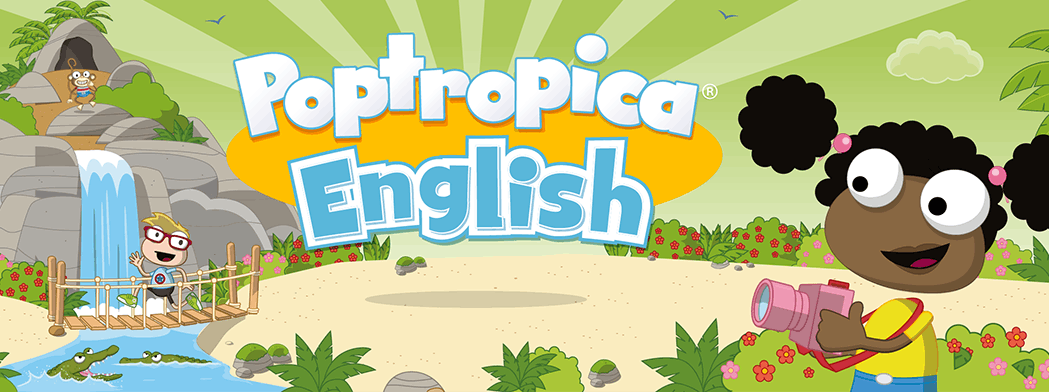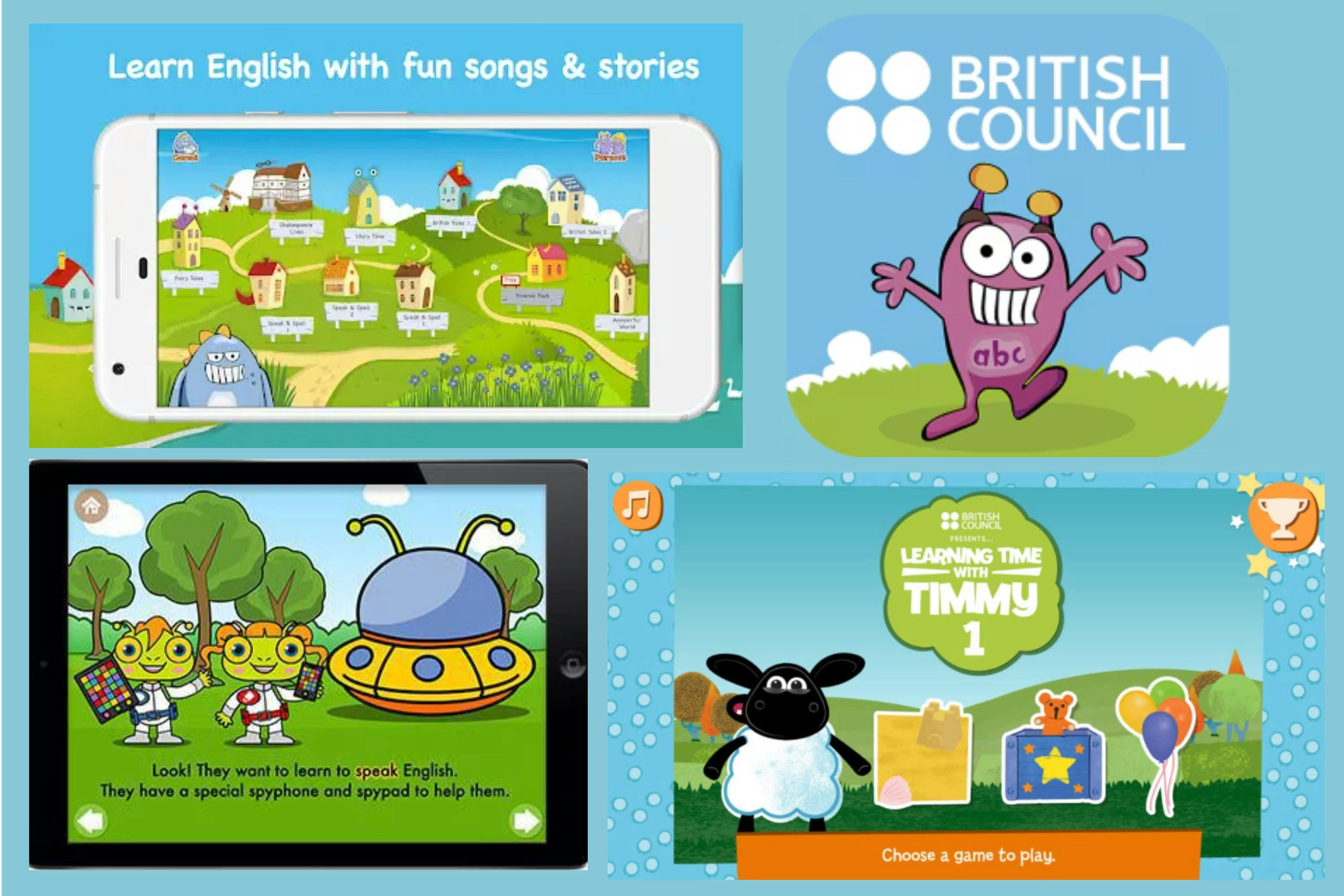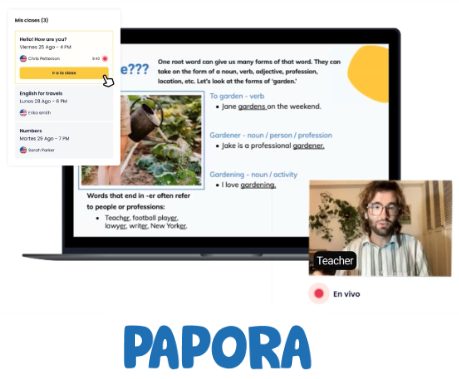Quick answer: the best English learning apps for kids are:
- Nominis (ages 6-12)
- Astrokids English (ages 2-9)
- Lingokids (ages 2-8)
- Poptropica English (ages 6-12)
- Dic-dic Dictation (ages 3-12)
- Pili Pop (ages 5-8)
- Fun English (ages 4-15)
- LearnEnglish Kids: Playtime (ages 6-11)
- EASY peasy (ages 4-8)

Giving your children the chance to learn English early opens the door to incredible benefits. It’s been shown to improve both language development and mathematical thinking.
List of the 9 Best Apps for Kids to Learn English:
Our team of experts has evaluated the top apps on the market based on their functionality, user reviews, content, design, activities, games, and more.
This way, we ensure that each app on the list is perfect for children to learn without distractions and achieve better results. Let's get started!
Looking for more than just an app? Discover Papora.
An online platform where you can learn English while having fun and without pressure. It offers certified native-level teachers and over 300 lessons to study.
Try it for free here

1. Nominis
Nominis is an English app for children ages 6 to 12. It seeks to encourage practice for just 15 minutes a day without parental help, helping children progress through interactive stories and educational mini-games, all in a safe, original, and ad-free environment.
Main features:
It has more than 400 illustrated stories narrated in English, accompanied by vocabulary, grammar, and comprehension exercises. Children actively participate, choosing how each story continues. The content and difficulty are also adapted to each child's pace.

Advantages and disadvantages:
✅ Get access to structured, high-quality content, backed by teaching expertise. Start with a 7-day free trial.
❌ Subscription is required after the trial period, and although they claim to offer learning opportunities in up to 6 months, there's no guarantee that all children will achieve results by that time.
2. Astrokids English
We start with an app created by Iteration Mobile S.L., which specializes in designing educational games to stimulate the creativity of young children and understands the importance of mastering English at a young age.
Main features:
You can download the app for free on Google Play or the App Store. It doesn’t take up much space, but there isn’t a paid ‘pro’ version at the moment.

Advantages and disadvantages:
✅ This app divides its content into highly engaging and easy-to-understand mini-games for children ages 2 to 9. ❌ However, users have complained about the app's slowness at certain times of the day.
3. Lingokids
With content designed by Oxford University Press, Lingokids promises a safe environment for your children to study and master the language. Each game within the app is designed to combine fun with effective learning.
Key Features:
The free version allows children to complete only three activities per day. To avoid this problem, you can upgrade and unlock the content by paying $14.99 USD monthly.

Advantages and disadvantages:
✅ The app has a menu so parents can set reminders and define how long they want their children to study. ❌ The problem is that its price is not very affordable compared to other options and it doesn't really offer a substantial improvement in content.
4. Poptropica English
If your child enjoys creating or imagining stories, using the Poptropica English Island Game is a great way to start learning English. Children learn by following the story of various characters who guide them and teach them lessons.
Main features:
Unlike other apps for teaching English to children, Poptropica English doesn't divide its content into sections. All vocabulary is presented in game situations. We emphasize that the app is free, but it includes ads.

Advantages and disadvantages:
✅ Its methodology relies on children connecting stories to each new word they learn, and this is very effective. ❌ The reality is that its content is more limited than other options and doesn't help children achieve a high level of proficiency in the language.
5. Dic-Dic Dictation
The Dic-Dic Dictation app uses spelling games and audiovisual dictation for children ages 3 to 12. Children see a picture and hear the word in English, then have to spell it correctly to continue.
Main features:
Its design is quite simple and doesn't take up much space on your phone. It's available for Android and iOS at no cost. It's also worth noting that all its content was created by educators and native speakers.

Advantages and disadvantages:
✅ The app allows you to choose or change the difficulty level based on the children's knowledge. ❌ However, its system only works as a means to increase vocabulary, being more of a complement to a course than a learning app.
Apps vs. Full Platform: The Difference is Papora
Our platform offers a comprehensive experience: expert teachers, unlimited monthly classes, and certificates up to advanced C1 level.
Start learning

6. Pili Pop
With over 300 games available and over 1,000 words to increase your child's vocabulary, this app is an interesting option. Its system is easy to use, has an attractive design, and features characters that teach you about various topics.
Main features:
From learning a single word to creating sentences, Pili Pop's method consists of helping children improve their listening comprehension by creating an immersive environment.
The app has a free version with limited games and activities. The full version costs $9.99 USD per month.

Advantages and disadvantages:
✅ Pili Pop is known for having some of the best games for learning English online. ❌ Its problem is that the platform loads content slowly, causing children to lose focus while studying.
7. Fun English
Created by Studycat, this app is one of the most downloaded on the Play Store, with over 5 million users. The platform promises an immersive environment for your children, prioritizing listening comprehension.
Main features:
It is recommended for children between 3 and 10 years old, and its content is divided according to the child's age. You can download the app for free, and your child will have full access to its more than 300 English phrases and words.

Advantages and disadvantages:
✅ Native American and British voices bring authentic pronunciation, something only Papora offers. ❌ The downside? Free use means ads that may distract your kids while learning.
8. LearnEnglish Kids: Playtime
This app was designed by the British Council, one of the most popular courses in the world. Its experts were tasked with designing content ideal for children over 6 years old.
Main features:
Its system is very similar to the Duolingo English learning app, although it adds interesting features to enhance children's writing skills. The app is also free and includes ads.

Advantages and disadvantages:
✅ Its main attraction is that it uses modern teaching methods, endorsed by British Council teachers. ❌ However, users have complained that its system can be slow to download content and songs for children.
9. EASY Peasy
Available for children ages 5 and up, you can download this app for free on Android and iOS devices. Its main objective is to help children remember words longer.
Main features:
To achieve its goal, it uses interactive games where you see an image, hear how it's pronounced, and then have to write it. Currently, there is no paid version with more content.

Advantages and disadvantages:
✅ The app offers you a daily report on your children's progress. However, ❌ its main disadvantage is that it takes up a lot of storage space on your device, which can interfere with its operation.
Which app should you use to help children learn English?
We know you want to know which is the best app or AI for learning English. Before downloading one, make sure it offers your children the best tools to learn English from scratch and stay motivated.
After evaluating all the options, we highlight apps like Astrokids English and Poptropica English. Both offer dynamic and entertaining content for children, offering good long-term results and going beyond a game app.

Learning English at any age is fun with Papora.
Forget about apps and boring lessons. Our platform has everything you need to level up to C1 and speak from day one.
Try a lesson

Frequently asked questions about apps for learning English for children
Most English learning apps for children are more of a complement to a real course or tend to focus solely on vocabulary. There are other specialized courses that can help your child reach an intermediate level of English at a young age.
Study time will depend on each child and their learning pace. Generally, it's recommended that children practice between 20 and 30 minutes each day so they can practice consistently and remember the lessons longer.



